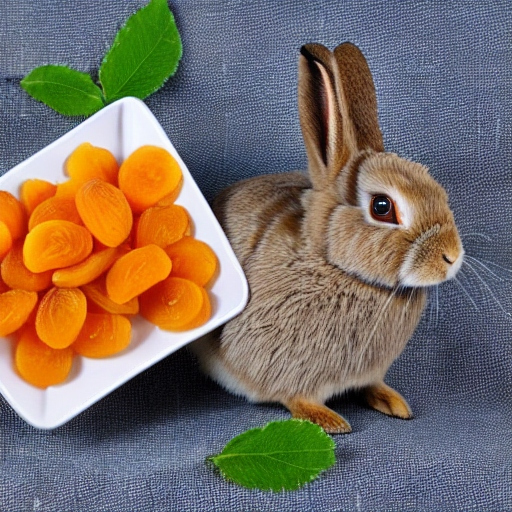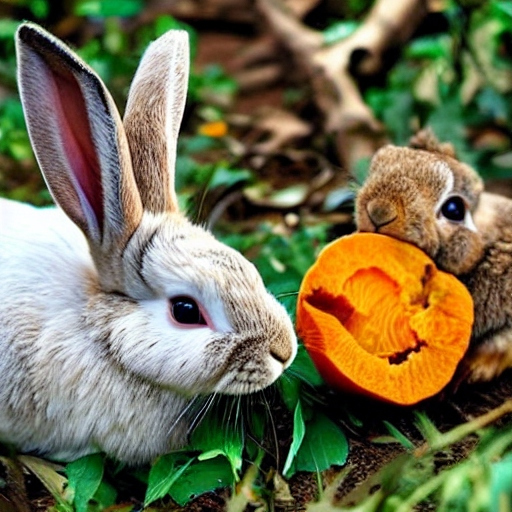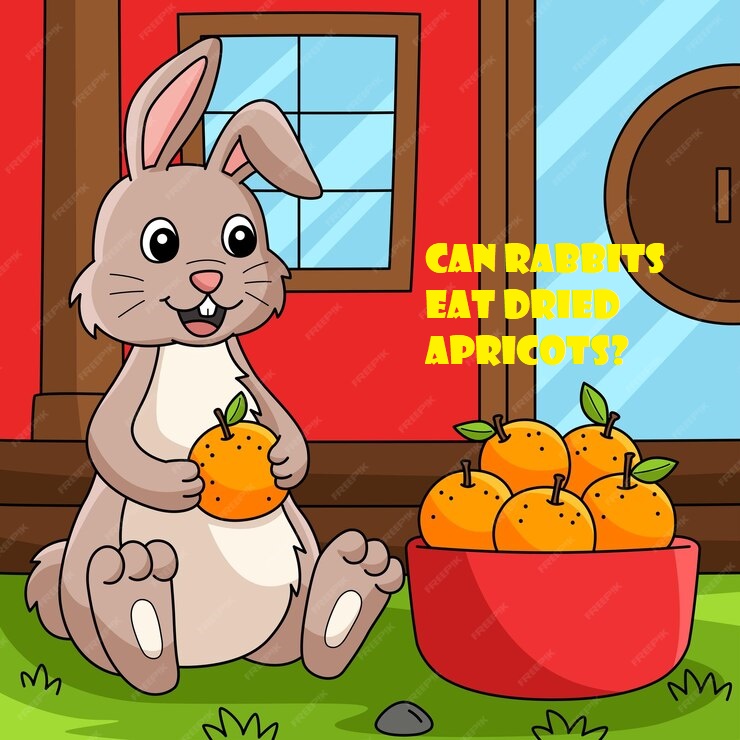If you’re wondering, “Can rabbits eat dried apricots?” you’ve come to the right place. As pet owners, we want to ensure our furry friends get a well-balanced and nutritious diet. And while carrots may be the go-to treat for rabbits, it’s always good to mix things up and introduce new foods into their diet.
In this blog post, we’ll dive into the “Can rabbits eat dried apricots? nutrition facts, feeding tips, and health benefits of dried apricots for rabbits.
So, let’s see if these sweet and tangy fruits are safe and beneficial for our fluffy companions!
Can Rabbits Eat Dried Apricots?
Yes. Rabbits can eat dried apricots! These sweet and tangy fruits can be a tasty and nutritious addition to your rabbit’s diet. However, it’s essential to feed them in moderation. Dried apricots are high in sugar and fibre, which can lead to digestive issues if consumed in excess. It’s best to offer them as an occasional treat rather than a regular part of their daily meals.
Remove the pit and any stems or leaves when giving dried apricots to your rabbit. Cut them into small, bite-sized pieces to prevent choking hazards. Introduce dried apricots gradually to observe your rabbit’s reaction and ensure they tolerate it well. As with any new food, it’s essential to monitor their health and consult a veterinarian if you notice any adverse reactions.
Remember, a well-balanced diet is vital to keeping your rabbit healthy and happy. So, offer your fluffy friend a small piece of dried apricot as a delicious treat!

Understanding the Natural Diet of Rabbits
Rabbits are herbivores, which means their natural diet consists mainly of plants. In the wild, rabbits eat a variety of grasses, leaves, twigs, and even bark. Their digestive system is designed to process fibrous plant material, and their teeth continuously grow to accommodate this diet.
Grasses are the foundation of a rabbit’s diet, providing essential nutrients, fibre, and hydration. Fresh leafy greens like lettuce, kale, and spinach also play a significant role in their natural diet.
These greens provide additional vitamins and minerals for a rabbit’s overall health. To mimic a rabbit’s raw diet, offering a combination of hay, fresh grass, and leafy greens in their daily meals is essential.
Hay should always be available, as it helps wear down their continuously growing teeth and aids in digestion. When available, fresh grass can be provided, but avoid grass treated with pesticides or other harmful chemicals. Leafy greens should comprise a small portion of a rabbit’s diet and can be offered in moderation. It’s crucial to introduce new greens gradually to avoid digestive upset.
Remember to wash all vegetables thoroughly before offering them to your rabbit to remove any dirt or residue. Understanding the natural diet of rabbits is critical to providing them with a well-balanced and nutritious meal plan. By replicating their wild diet as closely as possible, we can help ensure the health and happiness of our fluffy companions.
Nutritional Value of Dried Apricots for Rabbits
Dried apricots may be a tasty human treat, but what about rabbits? Well, regarding the nutritional value of dried apricots for rabbits, there are a few things to consider.
While dried apricots contain some beneficial nutrients, such as fibre, potassium, and vitamins A and C, they are also high in sugar. Rabbits have sensitive digestive systems, and consuming too much sugar can lead to digestive issues and weight gain. That being said, dried apricots can still be a part of a balanced diet for rabbits if given in moderation.
It’s best to offer them as an occasional treat rather than a regular part of their daily meals. When feeding dried apricots to your rabbit, it’s essential to cut them into small, bite-sized pieces to prevent choking hazards. And remember, permanently remove the pit and any stems or leaves before offering them to your furry friend.
Overall, dried apricots can provide some nutritional benefits for rabbits, but it’s essential to be mindful of their sugar content and feed them in moderation.
As with any new food, it’s best to monitor your rabbit’s health and consult a veterinarian if you have any concerns. So go ahead and offer your fluffy companion a small piece of dried apricot as a tasty and nutritious treat, but remember to prioritize their overall health and well-being.
Feeding Tips: How to Give Dried Apricots to Your Rabbit
Feeding dried apricots to your rabbit can be a delicious and healthy treat, but it’s essential to do it correctly.
Here are some feeding tips to ensure your rabbit enjoys this sweet fruit safely:
- Introduce gradually: Start by offering a small piece of dried apricot and observe your rabbit’s reaction. If they tolerate it well, you can gradually increase the portion size. Monitor their health closely and consult a veterinarian if you notice any adverse reactions.
- Cut into small pieces: Always cut dried apricots into small, bite-sized pieces to prevent choking hazards. Rabbits have sensitive throats, so making it easy for them to chew and swallow is essential.
- Remove the pit and stems: Before giving dried apricots to your rabbit, remove the pit and any stems or leaves. These parts can be hazardous and cause choking or digestive issues.
- Moderation is key: While dried apricots are safe for rabbits, they should be given in moderation. Remember that dried apricots are high in sugar and fibre, so consuming too much can lead to digestive problems. Offer them as an occasional treat rather than a regular part of their daily meals.
- Variety is essential: While dried apricots can be a tasty snack for your rabbit, it’s essential to provide a variety of other fresh fruits and vegetables in their diet. This ensures they receive a well-balanced and nutritious meal plan.
Following these feeding tips, you can safely introduce dried apricots into your rabbit’s diet and provide them with a tasty and healthy treat. Always prioritize their health and well-being by monitoring their reactions and consulting a veterinarian.

Health Benefits of Dried Apricots for Rabbits
Dried apricots offer a range of health benefits for rabbits.
Improves Eye Health:
Dried apricots can contribute to improved eye health for rabbits. These sweet and tangy fruits contain essential nutrients that support eye function and vision.
One of the critical nutrients found in dried apricots is vitamin A. Vitamin A plays a crucial role in maintaining the eyes’ health, as it is involved in the production of rhodopsin. This pigment helps the eyes adjust to changes in light. By incorporating dried apricots into your rabbit’s diet, you can provide them with a natural source of vitamin A that can help promote optimal eye health.
However, it’s important to remember that dried apricots should only be given in moderation, as they are high in sugar and fibre. Too much sugar can lead to weight gain and other health issues in rabbits. To ensure your rabbit receives the eye-boosting benefits of dried apricots without overdoing it, offer them an occasional treat alongside a well-balanced diet of hay, fresh grass, and leafy greens.
Monitoring your rabbit’s overall health and consulting with a veterinarian are always good ideas when introducing new foods to their diet. Taking these precautions can help keep your fluffy companion’s eyes healthy and ensure their overall well-being.
Protects From Diseases:
Dried apricots provide delicious flavour for your rabbit but offer potential protection from diseases. These sweet treats are rich in antioxidants, which help fight off harmful free radicals and strengthen the immune system. Antioxidants are essential for rabbits because they help prevent cell damage and reduce the risk of certain diseases.
By incorporating dried apricots into your rabbit’s diet in moderation, you can give them a tasty snack that may help support their overall health and well-being. Remember to consult a veterinarian for personalized advice on your rabbit’s diet and health.
Reduce Inflammation:
Dried apricots can reduce inflammation in rabbits. Inflammation is the body’s natural response to injury or infection, but chronic inflammation can lead to health issues. Dried apricots contain certain compounds, such as polyphenols and antioxidants, with anti-inflammatory properties.
These compounds can help reduce the production of inflammatory molecules in the body and promote a healthier inflammatory response. By incorporating dried apricots into your rabbit’s diet in moderation, you can provide them with a tasty treat that may help alleviate inflammation and support their overall well-being.
However, it’s important to remember that every rabbit is different, and individual responses may vary. If you notice any adverse reactions or changes in your rabbit’s health, it’s always best to consult a veterinarian for personalized advice. With the right approach and careful monitoring, dried apricots can benefit your rabbit’s diet.
Improves Skin Health:
Dried apricots can improve the skin health of rabbits. These delicious treats contain essential nutrients and antioxidants that can benefit their skin in various ways.
A critical nutrient in dried apricots is vitamin C, known for its role in collagen production. Collagen is a protein that helps maintain the elasticity and strength of the skin, promoting a healthy and vibrant appearance. By incorporating dried apricots into your rabbit’s diet, you can provide them with a natural source of vitamin C that can support their skin health.
Additionally, the antioxidants in dried apricots can help protect the skin from oxidative stress and damage caused by free radicals. This can contribute to a healthier and more resilient skin barrier, reducing the risk of skin issues and infections.
However, it’s important to remember that every rabbit is different, and individual responses may vary. If you notice any adverse reactions or changes in your rabbit’s skin health, it’s always best to consult a veterinarian for personalized advice.
Incorporating dried apricots as an occasional treat alongside a well-balanced diet of hay, fresh grass, and leafy greens can contribute to your rabbit’s overall skin health and well-being. So, offer your furry friend a small piece of dried apricot to support their skin health and make them even more adorable!

Precautions While Feeding Dried Apricots to Rabbits
When giving dried apricots to rabbits, it’s crucial to take some precautions:
- Moderation: Offer dried apricots sparingly and in small portions. Too much can upset their stomachs due to the high sugar content.
- No Additives: Ensure the dried apricots are unsweetened and free from additives or preservatives. Sulfur dioxide and other additives can be harmful to rabbits.
- Cut into Small Pieces: Cut the dried apricots into small, manageable pieces to prevent choking hazards. Rabbits can sometimes gulp food without chewing properly, leading to issues.
- Observe for Reactions: Monitor your rabbit after introducing dried apricots. Watch for any signs of digestive upset, changes in behaviour, or unusual stool. If you notice anything concerning, stop giving dried apricots immediately.
- Balanced Diet: Dried apricots should only be an occasional treat and not a regular part of their diet. Ensure their diet includes high-quality hay, fresh vegetables, and limited pellets.
Consulting a veterinarian or an animal nutritionist specializing in rabbits is always wise before adding any new food to your rabbit’s diet.
FAQA
Can rabbits eat dried apricots every day?
While dried apricots can be a tasty treat for rabbits, feeding them daily is not recommended. Dried apricots are high in sugar and fibre, which can lead to digestive issues if consumed in excess. It’s best to offer them an occasional treat in small, bite-sized pieces once or twice a week.
Are dried apricots safe for baby rabbits?
It’s best to avoid feeding dried apricots to baby rabbits. Their delicate digestive systems are still developing, and introducing new foods too early can lead to stomach upset or diarrhoea. Stick to a diet of hay, fresh grass, and leafy greens until they are old enough to tolerate treats like dried apricots.
Can rabbits eat dried apricots pits?
No, rabbits should never eat apricot pits. Apricot pits contain amygdalin, which can release cyanide when ingested. Cyanide is highly toxic to rabbits and can be fatal. Remove the pit and any stems or leaves before offering dried apricots to your rabbit.
Are dried apricots good for weight loss in rabbits?
While dried apricots can be a healthy addition to a rabbit’s diet, they should be given in moderation. Dried apricots are high in sugar and fibre, which can lead to weight gain if consumed in excess. It’s best to offer them as a small treat alongside a well-balanced diet of hay, fresh grass, and leafy greens to maintain a healthy weight for your rabbit.
Can rabbits with diabetes eat dried apricots?
Rabbits with diabetes should avoid dried apricots due to their high sugar content. Consuming too much sugar can cause a spike in blood glucose levels, potentially worsening their condition. It’s best to consult with a veterinarian to create a specialized diet plan for a rabbit with diabetes, considering their individual needs.
Conclusion
In conclusion, Can Rabbits Eat Dried Apricots While dried apricots are high in sugar and fibre, they can be offered as an occasional treat to avoid potential digestive issues.
Remember to introduce dried apricots gradually and monitor your rabbit’s reaction to ensure they tolerate it well. Cut them into small, bite-sized pieces to prevent choking hazards and permanently remove the pit and stems or leaves.
Variety is essential, so while dried apricots can be a delicious snack, providing a well-balanced diet of hay, fresh grass, and leafy greens is crucial. Dried apricots offer a range of health benefits for rabbits, including improved eye health, disease protection,

